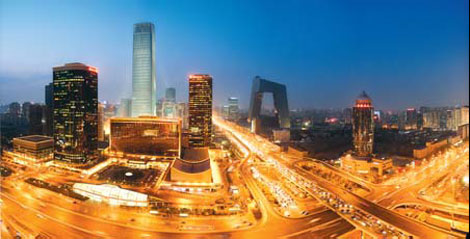Financing and internationalizing the city
Updated: 2011-09-14 08:04
By Wang Sujuan (China Daily)
|
|||||||||||
|
The area holds 50 regional headquarters for multinationals. |
Under the 11th Five-Year Plan (2006-2010) Beijing's CBD, in the Chaoyang district, has developed a business-oriented, international finance industry in the midst of media-related businesses.
The CBD, which takes up 17.8 percent of the Chaoyang district area, had a 29-percent increase in taxes annually, on average and contributed more than half of district GDP, retail sales, and jobs.
The CBD area used $1.96 billion foreign capital in 2010, accounting for 32 percent of the city's total, and witnessed 34.99 billion investment in fixed assets, about 6.4 percent of the city's total.
With pillar industries of international finance, high-end business, and culture and media, the central area is home to 50 regional headquarters of multinationals, 160 Fortune 500 companies, more than 100 international organizations, around 170 international media office, and more than 250 foreign-funded financial agencies.
Its three major finance centers - the World Trade Center, China Trade Center, and World Financial Centre - took shape during that period.
Other landmarks from the period include the CCTV headquarters and China World Trade Center Tower III. Key projects included Beijing Fortune Plaza, Beijing TV building, Beijing Yintai Center, and Central International Trade Center.
The area's buildings contain 8 million square meters of space and it holds more than half of the city's Grade-A office buildings and star hotels.
New goals
Beijing CBD's overall development plan for the 2011-2015 period is to become a world-class business center with industry advantages, improved services, a harmonious environment, efficient development, and its own brands.
Its GDP growth has been set at 9 percent annually and an increase in revenues of 9.5 percent. By the end of 2015, its GDP is expected to reach 210 billion yuan, and revenues of 18 billion yuan ($2.8 billion).
To reach this goal, it really needs to promote construction work, starting with the eastward expansion, and to increase the competitiveness of its modern industry, and improve urban life, management, and public services.
It also needs to speed up improvements to its traffic network.
The core area is expected to become a new calling card for Beijing, as a global canter and an engine of growth in the capital city.
There are already around 41 companies bidding on development projects in Beijing, including the CBD, two of which are the China Investment Co Ltd and China's CITIC Group, both of them large State-owned enterprises.
In addition, 16 financial institutions, three multinationals, and 20 real estate agencies are interested.
The CBD's companies are expected to bring in an aggregate of 50 billion yuan in annual taxes and, when upstream and downstream enterprises are added, a steady increase in tax revenues.
Beijing's CBD is the most internationalized part of the city will eventually represent the convergence of all global economic dynamics.
(China Daily 09/14/2011 page32)
